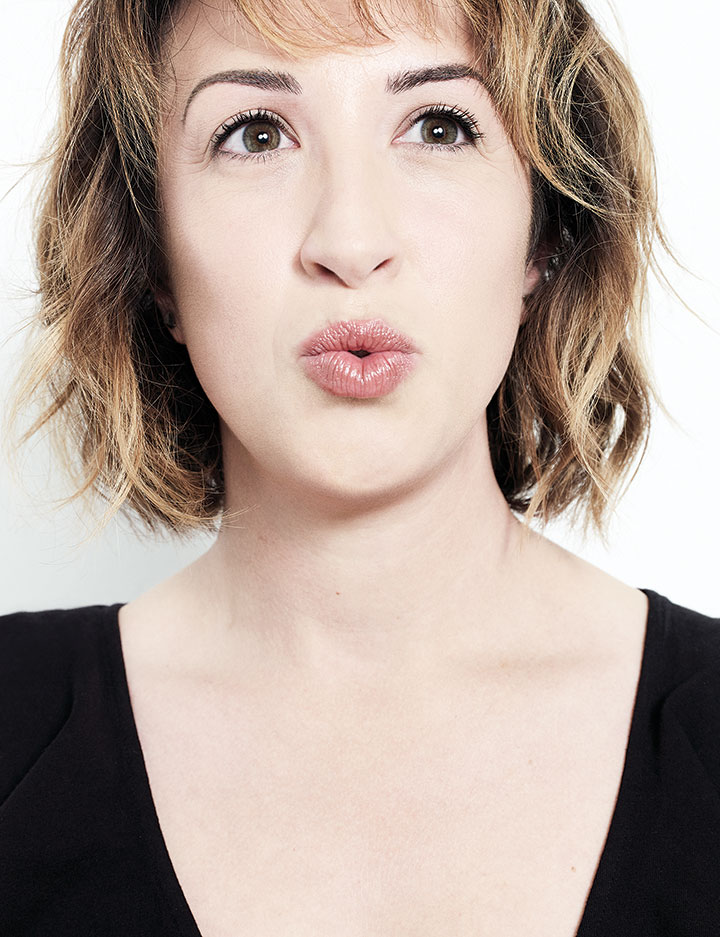Samara Bay ’02: You Say Tomato ...
How a fascination with phonetics led to a career as an accent and dialect coach to the stars
Ruth Negga was raised in Ireland and Joel Edgerton is Australian, yet the actors portrayed a couple from rural Virginia in Loving, the 2016 film about the landmark Supreme Court case that legalized interracial marriage.
Sitting in a canvas-backed chair throughout filming was Samara Bay ’02, the dialect coach to both actors — who subsequently received Golden Globe nominations for their performances, and an Academy Award nomination for Negga — helping them not only to voice those broad Tidewater “o”s, but to weave the sounds into their characters.
Bay teaches American dialects to foreigners and foreign dialects to Americans. Dialect coaches don’t specialize, though. She teaches every accent one can imagine: Pakistani, Scandinavian, you name it — including one she calls “vaguely Eastern European.” She has even improvised historical dialects, such as 1850s Appalachian Georgian. No one really knows what that one sounded like, so Bay taught a rural Ozark dialect instead.
“Accent” and “dialect” are often used interchangeably, but they are not quite the same. An accent reflects regional or social differences in pronouncing certain words; a dialect includes forms of speech. The expression “y’all,” for example, might be said with a Southern accent, but mashing the words “you” and “all” and using it for the second-person plural is characteristic of a Southern dialect.
Learning a dialect would seem to require only a good ear, but the process of developing a dialect is more complicated than that. Whatever accent she is asked to coach, Bay will first find samples of it. The best resource is a website called the International Dialects of English Archive, containing about 1,300 audio clips of native speakers from 120 countries. Want to hear someone speak with a Cypriot dialect? Navajo? Philadelphian? They are all there.
She next breaks down the dialect’s distinctive sounds using the International Phonetic Alphabet (IPA), which is commonly used by singers, therapists, and language teachers, and sends those, along with any audio clips, to help clients get started.
At their first meeting, usually in her home studio near the Hollywood Bowl (sometimes by video chat), Bay makes the intellectual physical. She likes to get her clients moving around, so she often converts the IPA’s hieroglyphs into gestures to convey some of the aural nuances and provide an easy reminder.
Especially early on, she wants them to do “the big, loud, bad version,” and in doing so, become comfortable playing with the sounds. The goal is not impersonation, but something more organic. Blend the accent with the character’s personality and the emotions within the script, and the accent becomes invisible and much more effective.
Bay has worked with stars on major movies and TV shows, but she also coaches unknowns preparing for auditions and business executives trying to improve their public speaking. A self-described “science nerd” — her father, Joel Primack ’66, is an astrophysicist and her mother, Nancy Ellen Abrams, writes about science and technology — Bay sometimes teaches classes at the Alan Alda Center for Communicating Science to help scientists convey their ideas to lay audiences.
Raised in Santa Cruz, Calif., Bay majored in English at Princeton and received a certificate from the theater program. She was first introduced to the IPA in an acting class at the American Conservatory Theater following her freshman year and was drawn in by the lesson. Before earning an M.F.A. at Brown, she was accepted into the Shakespeare Lab at New York’s Public Theater, where she worked with renowned dialect coach Kate Wilson, who later referred some of Bay’s first clients. Bay has since taught at universities and acting conservatories.
She calls her early theatrical training indispensable to the work she does now. “You cannot be a good coach to actors without understanding the actors’ process,” Bay says. “You have to understand how hard it is to integrate technical things and emotional things and memorizing.”
Although Bay receives screen credit for her work, the greater rewards are sometimes more subtle. While filming Loving, Edgerton ran into actor Édgar Ramirez, whom Bay had coached in three movies.
“Oh yeah,” Ramirez said, “you’re working with my dialect coach, Samara.”
“Um, she’s my dialect coach,” Edgerton replied.
LISTEN to Samara Bay ’02 discussing the phonetics that inform her work












No responses yet